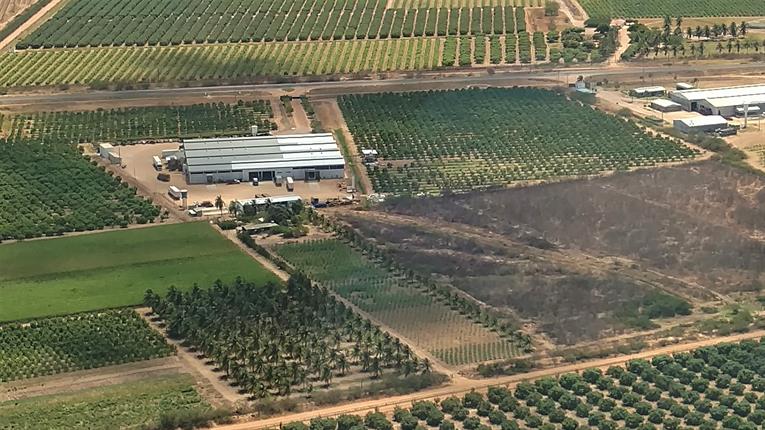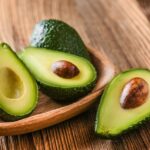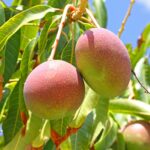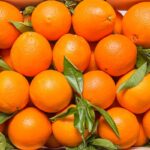Brazil eyes opportunities to strengthen fresh-fruit ties with UK post-Brexit

From the pages of Produce Business UK
In 2020, the UK ranked as the world’s second-largest importer of fresh fruits from Brazil, after the Netherlands, according to data from The Brazilian Fruit Exporters’ Association ( Abrafrutas ). During that year, the UK absorbed 16.2 per cent of Brazil’s supply, or 141,136 tonnes, worth US$124.9 million in value.
In light of Brexit, the Covid-19 pandemic, shifting consumer demand and the diversification of Brazil’s offer, coupled with production innovation, PBUK explores what the future holds for UK buyers. We speak with Abrafrutas and the Brazilian Trade and Investment Promotion Agency ( Apex-Brasil ), as well as top exporters: Fischer , Argofruta (owned by Total Produce ), and Labrunier (owned by El Ciruelo). Additionally, we hear from UK buyer VIDAfresh ; the largest European importer of Brazilian melons, and a leading importer of other Brazilian produce lines.
Post-Brexit Opportunities
The UK receives from Brazil mainly fresh melons, table grapes, mangoes, watermelons, limes and lemons, plus smaller volumes of Golden and Formosa papayas, Hass avocados, pineapples and apples. Less traditional fruits, such as pomelos, dates and persimmon, are growing in volume.
Looking ahead, the UK’s exit from the European Union (EU) presents a new opportunity for Brazil to strengthen its trade relationship with the UK, claims Marcio Rodrigues, Head of Agribusiness Department at Apex-Brasil.
“Brexit negotiations have provided the UK with an opportunity to establish a stronger, independent relationship with Brazil, and as the third-largest producer of fruit in the world, Brazil is responsible for providing the UK with a large supply of fresh fruit,” Rodrigues explains.
In recent years, Rodrigues claims Brazil has witnessed an increase in the levels of trade protectionism from the EU, which “adds controls and raises barriers to free trade, and, by extension, food production costs”.
“Although we have the EU-Mercosur Free Trade Agreement in place and the UK is a smaller market than the EU as a whole, Brazil sees a lot of opportunities with the UK post-Brexit, especially if current levels of protectionism experienced with the EU can go down.”
Jorge de Souza Abrfrutas BrazilJorge de Souza (left), project manager at Abrafrutas, concurs, adding that Brexit is projected to offer a “lucrative new business scenario”. “Brexit offers an opportunity for Brazilian fruit producers to export more directly and in equal tax conditions with other competing countries,” he points out. “Brazil and the UK are likeminded partners in supporting free, open and liberalised trade, so overall we see positive prospects for fresh fruit exports to the UK.”
Annually, the EU and the UK receive 70-75 per cent of Brazil’s fresh fruit exports. Over the past 12 months, trade relations between the UK and Brazil have continued to develop positively, and official negotiations are expected to launch in the near future. “Although Brazil and the UK are yet to agree a trade agreement, negotiators on both sides met late last year to discuss the possibility of a comprehensive trade deal,” reveals Rodrigues. “We very much expect Brazilian fruits to be part of the discussions when they are eventually launched given the UK’s appetite for Brazilian fruits, price competitiveness and consumer choice.”
In preparation, Brazilian export companies are strengthening their relationships directly with UK wholesalers and retailers instead of using intermediaries in other countries. According to Rodrigues, British companies are responding positively to these new commercial partnerships. “The new scenario optimises business results for all involved,” he notes. “It’s a win-win situation.”
Brazilian Fresh Fruit Exports to the UK in 2020
Product Value (US$) Volume Pct. Share
Melons 31,813,341 47,017 tonnes 25.5%
Grapes 27,317,546 12,416 tonnes 21.9%
Mangoes 16,403,801 14,583 tonnes 13.1%
Watermelons 15,707,600 32,864 tonnes 12.6%
Lemons and Limes 15,183,897 16,807 tonnes 12.2%
Papayas 4,179,215 4,525 tonnes 3.3%
Avocados 201,779 142 tonnes 0.2%
Pineapples 6,571 5 tonnes 0.01%
Pomelos 556 0.207 tonnes 0.0004%
Dates 159 0.044 tonnes 0.0001%
Persimmon 13 0.012 tonnes 0.00001%
Source: Abrafrutas
Exports Rise, Despite Pandemic
Brazil’s export share of the European market is projected to increase by 5 per cent year- on-year for the next three years, particularly for Brazilian mangoes, melons, avocados, limes and table grapes. So says Abrafrutas, whose members represent about 85 per cent of the fresh fruits exported from Brazil. The statistics include the UK, and are in spite of the cumulative effects of Brexit and Covid-19.
Importantly, a favourable exchange rate is buoying Brazilian growers and suppliers. “The exchange rate has been very favourable for exports, and profitability has been very competitive when compared to sales on the domestic market,” Apex-Brasil’s Rodrigues explains.
At the same time, work is ongoing to organise Brazilian fruit growers into cooperatives and production consortiums in order to achieve the proper production scale and quality standards necessary to be competitive in the UK and globally.
“Abrafrutas has contributed greatly to supporting educational activities amongst smaller farmers and their families, including: new credit options, access to brand new production technologies, and helping them to become high-tech growers and a part of the exporters team,” reveals Rodrigues. “Apex-Brasil has been a very important partner in that initiative, and the best example is the PEIEX Program , created to educate, train and bring new companies to the export world.”
As for the pandemic, Abrafrutas still expects UK sales to increase despite acknowledging that the pandemic will continue to affect the global fruit industry during 2021.
Fruit consumption is strongly associated to healthy living and improving immunity, de Souza points out. “Much like the rest of Europe, Brits are becoming increasingly health conscious and have a renewed focus on healthier foods and more natural products, such as fruits. Even during an unpredictable economic scenario, such as a pandemic, we consider a growth of 5 per cent per year achievable for our sector in the UK market as a most conservative projection. Strong growth in Europe and the UK is expected to continue for the foreseeable future.
UK Buyer Perspective
As a longstanding buyer of Brazilian fruits, Terry Watts, CEO of UK importer-distributor VIDAfresh (a specialist in melons, pineapples and citrus), would love to see volume increase to Europe. While Watts hopes that the pandemic’s positive impact on healthy eating will continue, he prefers to exercise some caution regarding predictions. “Brazil is not the only country looking for more share of both the European and wider international market,” warns Watts.
To support exports, Watts believes funding from the Brazilian government is needed for a cohesive marketing campaign that encompasses all Brazilian fresh fruits, rather than individual sectors or brands. This, he asserts, would enable Brazil to increase demand by directly targeting UK consumers, especially those less familiar with exotics and tropicals.
“The current Pink Lady campaign is a perfect example of how increased demand can be achieved,” Watts points out. “But the only way that funds should be spent to benefit Brazil and, therefore, the growers and the thousands of people they employ is to have a generic promotion for ‘Brazilian fresh fruit’ with their music, dancing, football, etc., and there is no better country than Brazil to do that with.”
Watts also suggests that those promotional funds could be gathered through an export levy, voluntarily contributed by the exporters on a per case basis. “If importers of Brazilian produce also did the same – and certainly VIDAfresh would be willing to contribute – can you imagine how much money could be raised?,” he considers.
Another challenge is to enlist the support of UK retailers to allow promotions in stores, says Watts.
“To increase consumption of fruits and vegetables in this day and age of growing and very concerning levels of obesity we need the help of the supermarkets,” Watts states. “We need them to engage with the likes of Apex-Brasil and Abrafrutas and other such grower organisations to allow more POS material [how and when to eat products] in their stores to make fresh produce more appealing to the consumer. That is the only way to increase demand, and that is the only way Brazil will increase their exports by 5 per cent year-on-year within the next three years.”
Pandemic response
After the initial shock of the pandemic, de Souza says Brazil has adapted to consumers shopping less, eating out less and seeking food with a longer shelf-life. During the last few months of 2020, UK-bound exports increased steadily as Brazil entered its typical peak supply period.
Brazilian apple exports to the UK from Fischer Agroindustria remain on course, according to Commercial Manager Wilson Passos. “We will be starting new shipments to the UK from February 2021, and, so far, our customers have not yet spoken about the consequences of the pandemic on the volume of business being planned,” says Passos, who notes that the UK is one of the most longstanding export partners for Fischer apples.
In fact, Passos says the business has been influenced positively by consumer calls for packaged fruit. “The pandemic ended up increasing the demand for consumer packaged products, and as almost all of our apples are packaged and sent to supermarkets this aspect has been of great value in maintaining the pace of business,” he states.
Brazilian Fresh Fruit Exports to the UK in Value Terms (US$):
September 2020 US$ 19.4 million
October 2020 US$ 23.5 million
November 2020 US$ 24.6 million
Source: Abrafrutas
Fruit With Potential
Abrafrutas has identified various opportunities to grow the volume and value of its UK- bound fruit exports, particularly as Brazil’s offer continues to diversify. Avocado is a future star product. During 2020, Brazil exported 142 tonnes of avocados to the UK, according to Abrafrutas, and volume has been rising annually since 2015. To progress further, de Souza believes the only challenge is ensuring that Brazil can satisfy demand.
“Hass avocados are very well-known; it is just a question of increasing production area and Brazil has succeeded,” he reveals. “Brazil has the potential to become one of the most relevant exporters of Hass. Growers have planted a lot of new orchards, and it will be possible to offer higher volumes for export from 2023 onwards. It takes around four years to start producing from a new tree.”
Papaya is another fruit that is a strong contender for UK buyers. Although popular in Brazil and other tropical countries, the fruit is not so well-known in Europe.
“Promotions at The London Produce Show and Taste of London events have demonstrated that UK customers love papayas when offered with quality, stored under the appropriate conditions and sold at the ready-to-eat stage,” says de Souza. Papayas are extremely perishable and need to be airfreighted, meaning the fruit is usually is positioned in the 'premium category’ and sold at higher prices.
“We have already identified the management of storage conditions at importer and supermarket warehouses as one of the major problems in the UK and Europe that is impacting on the quality and volume sold,” explains de Souza. “We have been working hard to protect the fruit quality of papayas to ensure the best flavour possible to customers, especially for fruit that is sensitive and prone to perishability.”
New seedless grape varieties from Brazil are coming on stream too. “We have new varieties with better taste and texture,” reveals Karina Cassaro, quality manager at Labrunier – one of Brazil’s biggest table grape producers. “These new varieties offer a distinctive flavour and the possibility of year-round supply from qualified producers who meet all certification requirements.”
The new varieties also offer better productivity for Labrunier, which is also adapting its business in response to climate change, as well as introducing production techniques that allow for a further reduction in the use of pesticides and greater care for the environment.
“Plastic coverings in the field allow the fruit to have greater durability and quality during the rainy seasons, plus we have new sustainable packaging as requested by customers,” adds Luiza Barni Bonin, Marketing Manager at Labrunier.
Lime, mango and melon usage in food and drinks is expanding also. Increasingly, they are being incorporated into home cooking and juicing, which bodes well for Brazil.
“We see enormous potential in the UK for both limes and mangoes,” claims Daniel Briso, Marketing Director at Argofruta. “We believe there are still untapped opportunities in educating and inspiring consumers to integrate limes into the preparation of meals; something which we expect will see increases in retail sales dwarf those of wholesale going forward.
“Mangoes are benefitting from ever increasing quality and consistency, which has translated into growth across the foodservice sector and via in-home consumption,” adds Briso. “There remains some more work to be done to help consumers learn more about mangoes but the opportunity to increase consumption in the short term is very real.”
Of course, other country suppliers of limes have established a foothold in the UK market, but Briso believes that Brazil’s capacity to supply consistent volumes of quality limes, as well as mangoes, for 52 weeks of the year is “hugely important."
“By virtue of significant domestic consumption, Brazilian producers can exercise greater control than other exporters over volumes, yields, waste and the specifications for exportable fruits,” he claims. “We are confident in our capacity to consolidate our position as the emerging year-round partner of choice for British customers.”
Apple exports to the UK also have an opportunity to grow, according to Passos at Fischer.
“The sales potential for the UK market is quite significant,” Passos claims. “The biggest challenge we face is the limitation we have in offering more fruit in smaller sizes, depending on our production. We are taking steps to develop and expand the market with regard to medium-sized fruits, where we have conditions of greater supply.”
Abrafrutas also believes lesser-well-known Brazilian fruits, like guava and Prata banana, have strong potential due to their “unique flavour, functional properties, quality and available volume”.
“We would need to invest in promotions and put a lot of effort into communicating the mentioned advantages of those fruits,” de Souza acknowledges. “It is still a job to be done, but it’s very promising.”
Sustainability Gains
As well as offering Europe a counter-seasonal range of quality fruits to satisfy the health trend, Brazilian exporters have been improving their production techniques by integrating sustainability and efficiency learnings from research carried out by Brazil’s leading agencies.
This includes water irrigation, including widespread natural irrigation and green water use, which means that only 9 per cent of Brazil’s crops require artificial irrigation, according to Abrafrutas.
Furthermore, growers have integrated organic fertilisation techniques, such as biological nitrogen fixation – a natural process that occurs by associations of plants with microorganisms in the soil. This has been a major drive for efficiency in Brazilian crop management.
“The use of these techniques has meant a massive reduction in the use of artificial fertilisers which, according to some estimates, has reduced CO 2 emissions by 60 million tonnes,” attests de Souza of Abrafrutas.
There are other more specific examples. Agrícola Famosa, Brazil’s largest melon grower, has implemented various sustainable growing methods, including organic pest control to protect the 300 million pollinator bees that live across the company’s plantations. Agrícola Famosa also recycles almost all of its waste into organic fertiliser, and utilises windmills to provide electricity to the company and the surrounding area.
Argofruta is investing in new technologies and greater efficiencies at a field level. The firm is increasing the density of trees per hectare and integrating post-harvest technologies with the aim of raising product shelf-life and quality.
“Since the 1970s, Brazilian agriculture has led a huge drive towards innovation and efficiency in the sector,” claims de Souza. “This has meant that while production has gone up by more than 414 per cent, the total area used for production has only increased alongside in the same period by 69 per cent. As we look to the future, we recognise the importance of sustainability and the need to grow more with less. This is a responsibility we take seriously. Our focus, therefore, in the coming years will be on driving innovation and efficiency even further.”
















































